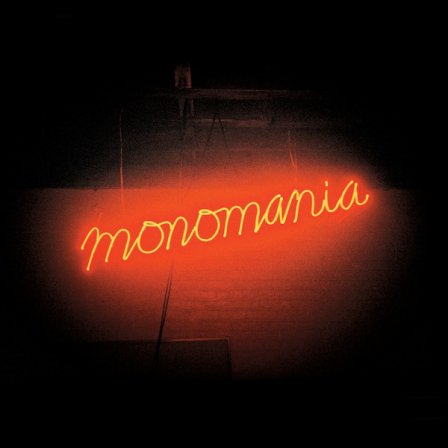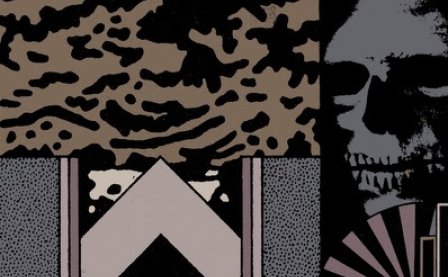You’ve been reading about it for days already, weeks even. They’ve been locking journalists in bathrooms, chopping off their fingers, and coming to terms with the dear Connie Lungpin — no, she’s not a character for the album, just some fragment of a million identities assembled on any given day — all in the midst of prep for Deerhunter’s fifth album, the highly anticipated Monomania. Nocturnal garage? Nah, that’s just off-the-cuff spout, some whimsical kindling for a raging press furnace; this is the business, this is them, back to black.
By “them,” I’m referring of course to Bradford Cox, the flamboyant and often genial scallywag who possesses the rare gift of being able to come across like a misunderstood rock overlord, a nutty maverick, and a complete weirdo all in the same sentence — he’s also responsible for one of the greatest cover photos ever, among other things. But despite any cynicism, that very personality — fictional or otherwise — also frames my thoughts on Monomania, the discussion points for which I’m gonna straight up adapt/plagiarize from a TMT thread on the band’s latest offering.
This is Deerhunter’s first release with their new bass player, Josh McKay, who filled in after the unexplained departure of Josh Fauver. The switch was quite sudden and unplanned, but it saw the band coming together in a way that they hadn’t experienced before; their recording sessions led to ditching all the ambient chicanery, disorienting tape loops, Neu!-wave drone experiments, and the “frail beauty” of previous material — i.e., the very stylistic preferences that initially got me hooked. Instead, the Atlanta five-piece presents a scattered garage rock full-length that borrows from Mudhoney and Meat Puppets just as much as it does from the bombardment of influences our delightful frontman has pointed to, which leads nicely to discussion point #1:
What does “going back” to rock even suggest?
In the context of Deerhunter’s catalog, it could mean two things: Firstly, that the group is pursuing a style that’s slightly more akin to their debut, Turn It Up Faggot, than anything they have released since, particularly in terms of ruggedness and energy. Secondly, that their impression of modern rock music is generally void of the influences they are pulling on here, and that they are returning to an aesthetic they deem otherwise sidelined at a time when fucking with the tropes of American rock has become more of a mainstream trend than attempting to reanimate them. But then again, this is Mr. “Sodomize Mediocrity” we are talking about, so that intention could be interpreted in a whole manner of different ways. What it doesn’t mean is that the band perceive rock to be any less progressive than the other styles Deerhunter have accommodated over the past eight years, because if it were, the bulk of Monomania would stand as a grand testament to counter argument.
Whatever going back might constitute, scuzzy, lof-fi punk rock is definitely the well from which the LP draws its water; from the acoustic mid-section build up on “Blue Agent” to the disarming throb of “Leather Jacket II,” Deerhunter have tucked away any refined Krautrock preferences in the place of a rougher, harsher angle. Recorded through an assortment of 8-tracks and cheap mics, this is an effort far more concerned with dismantling elegance than striving to accomplish it, and the styles that are used to pull that off are dominant and forceful — see the title track’s grinding halt, for instance. That aggressive mood goes on to contradict themes of weakness and debility, which surface casually on the album’s wonderful highs as well as its hapless lows: “I’ve been feeling like I’m gonna be sick,” “I’ve been feeling like I’m weak, yeah” Cox whines on the insufferable “Dream Captain.” He jabs at the chorus — “I’m a poor boy from a poor family / There’s nobody left to take care of me” — and in so doing transforms a past plea for sympathy into a twisted blast of boastful narcissism. “Something starts to shut down inside/ My body and my tired mind” he then declares on the brilliant “Sleepwalking,” a later number that proves to be one of the best on the album and complements the rickety dream pop pulsation of Lockett Pundt’s “The Missing.”
Even though it might lack the assertiveness present on every other piece, Pundt’s effort is beautiful and collected; the malignant fuzz of guitar feedback is replaced with smooth textures on par with the sprawling “Desire Lines,” affirming his knack as a songwriter who appears most comfortable in Cox’s company. It seems like quite an odd partnership, which goes all the way back to their days at high school, but the calmer, certainly less obnoxious Pundt embodies a captivating presence alongside his old chum in a fashion that didn’t shine through as brightly on his own Spooky Action At A Distance. But then again, those perceptions are all crafted from what I’ve read about the companions in print, which brings me to discussion point number #2:
Interviews often contribute to the proverbial hype machine that offers little insight into the actual listening experience.
This is frequently the case, particularly when higher profile musicians have a slew of interviews to get through on a daily basis as part of their latest press cycle. However, they also help in providing a context for songs and compositions; they inform as to how different works and processes come about, the ideas behind them, and the personalities of those responsible. Sure, the results are subject to a specific line of inquiry, editorial whim, and the publisher’s temperament, but they also have the potential to shape the way in which we, as listeners, allow that to interfere with our experience. In the case of Monomania, it’s a tricky one, because Cox governs the bulk of these tracks in a similar way that he dominates any conversation surrounding Deerhunter, and due to the manner in which he projects himself in every interview, those background perceptions are tough to shift.
Every song on here, with the exception of “The Missing,” mutated from a series of depressive and boozy late-night jam sessions, through which Cox accumulated “three or four hundred songs.” The contents and the style of the album therefore come deeply rooted in personal endeavors, which provide a platform for his fixation on sickness and an insight as to the directional assertions injected into the recording process. Dictatorial or otherwise, he is undoubtedly a talented and resourceful entertainer; his vocals in particular sound superb throughout, most notably on “Back To The Middle,” where his crackled yelps complement a playful guitar melody that’s enough to get even the most skeptical of listeners tapping their toe. On the penultimate track, “Nitebike,” he delves once again into the realm of vulnerability and ill health while allowing precedence to reside in that nocturnal edge, achieved through hollow clicks, echo, and reverb. Never is he more dominating though than on “Punk (La Vie Antérieure),” which is an embodiment of that recent Fallon performance — rebellion through ambivalence, carelessness, and a moody shrug of the shoulders.
Embroiled, then, in a sort of by-proxy, pseudo-context of interviews, online press, and expectation, all lorded over by Cox’s presence, it’s little wonder that Monomania sounds as though it has been commanded by the man of the moment. Consequently, the hardline bratty stomp of “Dream Captain,” the indignant charade of “Punk (La Vie Antérieure),” and even the rattled country swagger of “Pensacola” are difficult to stomach. Having said that, the remaining tracks are incredibly catchy rock ‘n’ roll songs wrapped in this brilliant lo-fi feel, which genuinely complements the band’s aesthetic. The record is driven, directed, and in some cases throttled by the very force that had me dubious from the outset. This is by no means a wholly negative attribute, but Monomania will be remembered as the album where Deerhunter veered from their carefully acquired sound as opposed to constructing a more pronounced encapsulation of it.
More about: Deerhunter




